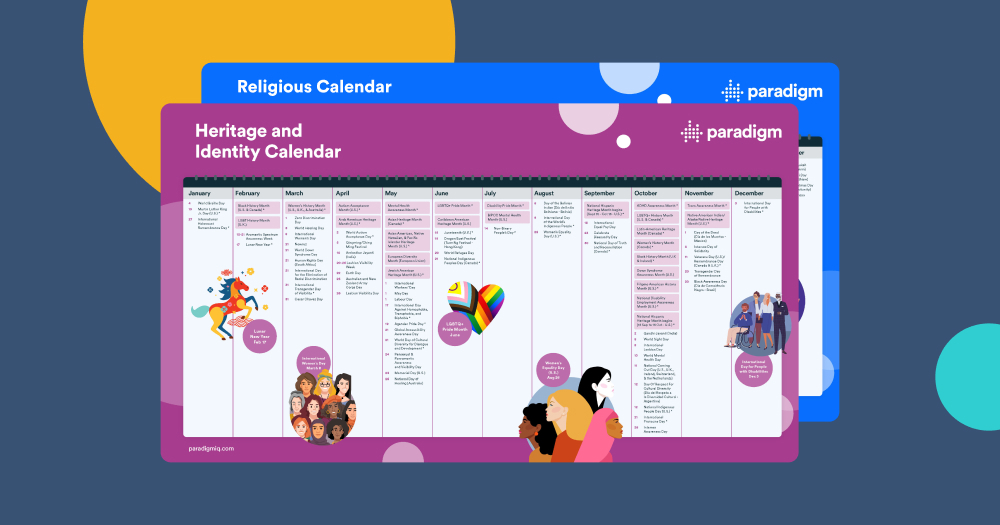The blog was written by Paradigm’s Head of Services Natalie Johnson and Director Evelyn Carter, PhD
The blog was written by Paradigm’s Head of Services Natalie Johnson and Director Evelyn Carter, PhD
The past few years have highlighted the appalling outcomes stemming from systemic inequities among demographic groups that exist in our communities: the murders of George Floyd, Ahmaud Arbery, Breonna Taylor, and Nina Pop; the outsized impact people of color and the disabled are facing with the coronavirus pandemic; and an uptick in racism against Asians.
Employees who are a part of these groups are experiencing trauma that they cannot simply compartmentalize when they are “on the clock”—there has never been a better time for people from majority groups to think about how they can support their colleagues and create more equitable, inclusive communities and organizations. One of the most poignant ways people can do so is through allyship, which is an ongoing commitment to learning and taking courageous action to create more equitable and inclusive experiences and workplaces.
How Can You be an Effective Ally in the Workplace?
Learn About Other People’s Experiences.
Allyship training involves re-learning the way you see the world, viewing situations not from the lens of your own experience or perspective, but based on the realities and experiences of others. That awareness includes teaching yourself to notice inequity—not just overt actions like the use of derogatory language, but also inequity in subtle forms, such as unconscious bias.
For example, female leaders, particularly black women, are often criticized more harshly and receive personality-based feedback instead of skills-based feedback. Marginalized group members have long noted these experiences, but majority group members often miss the subtler signs of bias. Exposure to the experiences of folks from different backgrounds is a catalyzing force for change.
Listen to Feedback, and Lean into your Mistakes.
Effective allyship requires being open to feedback, constantly evolving your thinking, and embracing discomfort. As an ally, you will encounter many situations that make you uncomfortable, whether it’s receiving feedback about your behavior, learning information that challenges your perspective, or occupying a space where you are the numerical minority.
For example, if you learn that your well-intentioned comment had a negative impact on a person you were trying to support, instead of acting defensively or shying away from similar situations in the future (which many people often do!), you can embrace the mistake as a chance to learn. Don’t be afraid to take constructive criticism. Too often, difficult conversations are shut down because people get uncomfortable, anxious, or scared they’ll say the wrong thing. Instead of letting those feelings stifle important conversations, let them help you grow as an ally.
Take Action Regularly.
Being an effective ally is not only about listening and learning; it requires taking courageous action. Because allies are often privy to conversations and spaces that marginalized group members are not, you have the power to advocate for inclusive practices. For example, if a person from a marginalized group is not considered for a stretch assignment despite having all the same qualifications as a majority group member, you can push the group to reconsider by asking questions and encouraging the group to explain their decision-making process.
You can also proactively suggest more inclusive practices, like encouraging all webinars or company presentations to have closed captioning for people who are hearing impaired. This is especially effective because allies face fewer consequences for going against the norm than marginalized group members, who are often dismissed or seen as complaining when they speak up about discrimination.
Use Your Own Privilege.
Finally, being an effective ally requires finding ways to use your own power and privilege to lift up an underrepresented group, and support the work they’ve been doing for decades. Not everyone has been given the same advantages and it is important to recognize that. Being an effective ally is not about offering unsolicited advice about how you think change should happen. It’s about using your position to communicate your stance as an ally, denounce inequity when you see it, and provide people with the support, tools, and resources they need to promote change themselves. It also means bringing people who look like you along in the allyship journey so that more people are ready to take action against inequity—and holding yourself and others accountable to higher standards.
Allies play a pivotal role in creating an inclusive environment. Using your privilege to denounce inequity and advocate for others is needed now more than ever, as marginalized groups are disproportionately impacted by economic downturns. Helping employees build allyship skills is a key lever to creating an inclusive workplace in a particularly challenging time. Investing in the development of those skills now can foster better relationships and strengthen organizations as we navigate changing norms.
Building Allyship in the Workplace with Paradigm
For tips on how to practice allyship in the workplace and build a more inclusive company culture, contact Paradigm today. Our goal is to give you tangible tools that you can use to build a personalized allyship program in your office. Our chief diversity officer and entire team are dedicated to fostering an inclusive and diverse workplace where every team member feels valued.

 Our website uses cookies to distinguish you from other users of our website. This helps us to provide you with a good experience when you browse our website and also allows us to
improve our site. By continuing to browse our website, you’re agreeing to our use of cookies. For more information, please read our
Our website uses cookies to distinguish you from other users of our website. This helps us to provide you with a good experience when you browse our website and also allows us to
improve our site. By continuing to browse our website, you’re agreeing to our use of cookies. For more information, please read our




